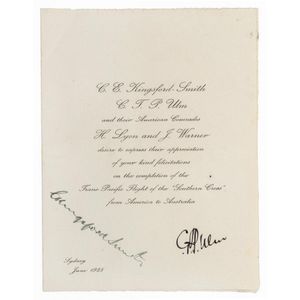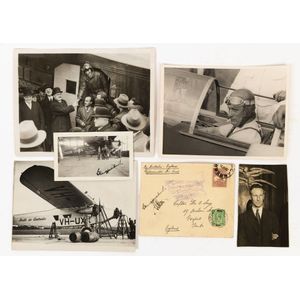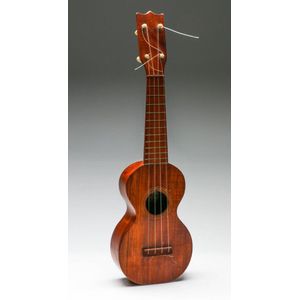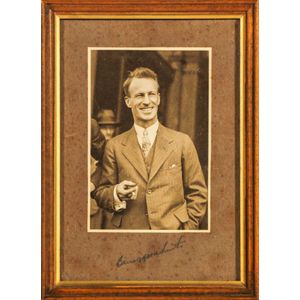
Trans-Pacific Flight Gratitude Note Signed by Kingsford Smith & Ulm
Charles Kingsford Smith (1897-1935) & Charles Ulm (1898-1934) original pen signatures on a June 1928 printed note, expressing their gratitude for the support they had received 'On the completion of the Trans-Pacific flight of the Southern cross from…

Vintage Aviation Memorabilia: Ticket Stub and Radio Hobby Magazine
Circa 1934 printed ticket stub 'Souvenir of flight in the monoplane Southern Cross', together with a small photograph of passengers boarding the plane while Charles Kingsford Smith walks beside it. Also Vol.1 No.1 April 1939 first edition of 'Radio and…

Kingsford Smith's Signed Photos and Envelope from Historic Flight
Sir Charles Kingsford Smith (1897 - 1935): a group of photographs (including one signed) and an envelope carried aboard the 'Southern Cross' on the April 1931 flight from Australia to England - signed by Kingsford Smith and his co-pilot G.U. 'Scotty'…

Kingsford Smith's Signature with Southern Cross Plane Name - Authentic
'C. Kingsford Smith / Southern Cross' fine original pen signature together with the name of Smithy's famous aeroplane, on a piece, overall 7.5 x 11 cm.

Sportsmen of the World Trade Cards Complete Set 1934
1934 Amalgamated Press: Sportsmen of the World, complete set of trade cards (32), including Charles Kingsford Smith, Jim Mollison, Alan Cobham, Max Baer, Bill Woodfull, Don Bradman and Jack Crawford.

Autographed book by Charles Kingsford Smith
Autographed By Charles Kingsford Smith: 'The Old Bus', [Herald Press, Melbourne] 1932, 224pp + photo plates; decorated blue hard-cover; signed and endorsed ' C. Bruce Andrews Esq. with best wishes CKingsfordSmith 4.11.32',

Kingsford Smith's Last Flight Envelope with Pen Autograph
Charles Kingsford Smith pen autograph on an envelope carried by him on the 18th July 1935 Last Flight of the 'Southern Cross' from Sydney to Richmond.
![[Sheet Music], 'Hats off to our Airmen' - A Song and Toast to…](https://img.carters.com.au/300x300/ea3e1b41e6c711fd3d85cd7dd60cb6d8.jpg)
Hats off to our Airmen
[Sheet Music], 'Hats off to our Airmen' - A Song and Toast to Kingsford Smith and his Comrades.', Words by Cliff O'Keeffe; Music by Harry Grunden. Published by J. Albert & Sons, 1928. Written and released in 1928, following the first successful crossing…

Lost Flight: Kingsford Smith & Pethybridge's Tragic Journey
The loss of Charles Kingsford Smith & Tommy Pethybridge: a scrapbook containing many newspaper cuttings regarding their flight from England to Australia, during which they hoped to break the speed record established by Scott & Campbell-Black a year…

Signed Southern Cross Flight Envelope & Photograph
The last flight of the, Southern cross, . 18th July 1935 special envelope carried aboard the, Southern cross, on its' flight from mascot to Richmond. The envelope is numbered, 16, and has been signed by everyone on board: Charles Kingsford Smith, Mary…

Sun-Telegraph Airways Exhibition: Celebrating Australian Aviation History
Illustratir the, sun, - Telegraph, Airways exhibition, February 1935 at the Sun-Telegraph building, Sydney: a complete original catalogue for this important exhibition, 24pp + covers. The exhibition featured, a collection of photographs and exhibits…

Trans-Tasman Air Service Development Company Limited Minute Book
Minute book from 14th June 1935, the first meeting of the board of Directors: Sir Charles Kingsford Smith, Captain P.G. Taylor, B.T. Sheil and J.W. Stannage, up to the final entry on 29th May1936 Trans-Tasman air service Development Company limited: the…

Kingsford Smith's Letter on Non-Mail Carrying Flight
Charles Kingsford Smith: 21 March 1934 letter from Christchurch addressed to a correspondent in Invercargill; typed, but signed by Kingsford Smith, in which he explains that he did not carry mail on his flight between those two cities.

Kingsford Smith sets new solo flight record
Kingsford Smith's record England - Australia solo flight: 4 October 1933 original Dutch press photo with affixed details: Sir Charles Kingsford Smith studying a map of the route he will take before leaving Heston Aerodrome today. The plane was a Percival…

Original Press Photos of Charles Ulm's 1928 Flights
Charles Ulm & his 1928 Flights: three original press photographs associated with the May/June 1928 Trans-Pacific flight with Kingsford Smith, one endorsed, Mrs Ulm sees the plane arriving at Sydney, and dated July 12, 1928; also, a charming press photo…

Oakland Airport & Trans-Pacific Flight Memorabilia
Oakland Airport & the 1928 Trans-Pacific flight: original associated press photo of James Warner (radio operator) & Charles Ulm (relief pilot) titled, a minute to Go, at Oakland Airport while Kingsford Smith was warming up the engines of the Southern…

Kingsford Smith and Aviation Photos
Charles Kingsford Smith photos: a folder containing press photos and others, mainly featuring Cks but also his wife, Mary, the, Southern cross, the, lady Southern cross, other aviators, etc. (20+ items).

Early Ukulele with Provenance in Road Case
A J Albert & Son early ukulele in case, length 52.5 cm. Provenance Sir Charles Kingsford Smith comes in a possibly later road case

Autographed Kingsford Smith Photo in Elegant Frame
A signed Kingsford Smith framed photograph 25.5 cm x 18.5 cm

Historic Autograph Book: Signatures from Famous Figures
Autograph Book with signatures mostly from the 1920s-30s including Robert Baden-Powell & Mave Baden-Powell; aviators Charles Kingsford Smith, Charles Ulm & Jean Batten; Prime Ministers Earl Page, Billy Hughes, Stanley Bruce & Robert Menzies (Australia),…

Kingsford Smith's Camphorwood Campaign Chest
A camphorwood lined campaign chest of Historic interest, early 20th century, a brass strapped chest with a candle box to the interior, and containing a legal letter from Haines & Polites Barristers and Solicitors confirming the item as formerly the…

Four Silver RAM Coins Collection
Four ram silver coins comprising of a 2002 Adelaide pound $10, a 2004 Bicentenary of Tasmania $5, a 1997 Sir Charles Kingsford Smith $1 and a 1998 Howard Florey $1

Royal Doulton Kingsford Smith Whisky Flask with Sydney Scene
Royal Doulton Kingsford Smith whisky flask marked for Dewars, with scene of farm cove, Sydney, marked to base and Reg no 63665, and 150.

1929 Kingsford Smith Newspaper Clipping in Frame
Framed Kingsford Smith newspaper clipping dated 1929, 63 cm x 82 cm

1933-34 Carreras 'Turf' Sports Personality Caricatures Set
1933-34 Carreras 'Turf': Sports 'Personality Series' of caricatures by Bob Mirams, complete set (24), including cricketers Don Bradman, 'Vic' Richardson and Bill Woodfull, footballer Haydn Bunton, plus billiardist Walter Lindrum and flying ace Charles…

Don Bradman's Lifemask: 3-D Portrait from 1930 Ashes Tour
Don Bradman Lifemask 1930. The original lifemask of the Don as produced by Thelma Dahle on Bradman's return from his record-breaking 1930 Ashes tour. Here we have the wilful, resiliant and confident 21 year old, in 3-D. In a specially made collapsible box…

Vintage Autograph Book with Bradman, Kingsford Smith & Harvey
1930s Autograph Book including c.1930 NSW cricket team with 11 signatures with Don Bradman & Archie Jackson; plus Charles Kingsford Smith twice. Also 2006 Bradman Luncheon menu signed by Neil Harvey & Sam Loxton.

Kingsford Smith Airline Memorabilia Collection
Collection of Kingsford Smith airline memorabilia including a signed print To Australia by air: Kingsford Smith and his companion over Suva, a framed 1929 daily telegraph newspaper pictorial clipping, two 1930's original framed Southern Cross aircraft…

Kingsford Smith: Air Pioneer Watercolour with Signature Plate
A framed watercolour of Charles Kingsford Smith of Southern Cross and first Pacific and Tasman crossing by air fame, watercolour, with original CK Smith signature plate. 22.5 x 17.5 cm

Unused Letterheads for Kingsford Smith Air Service Ltd (1932)
5 unused Letterheads for Kingsford Smith air service Ltd, 1932.

RAAF DH9A A1-28: A Historic Airplane
Framed & glazed photograph. RAAF de Haviland DH9A was one of thirty gifted by the British government after the first World War so that Australia could form an air force. This plane A1-28 (previously E9692 RAF) was manufactured by Mann, Egerton & Co.,…

Smithy and Ulm visit wounded war veterans
Press photograph mounted on cardboard. Kingsford Smith & Ulm visit wounded great war Veterans at the Randwick (Sydney) military Hospital. Smithy is wearing his RAAF uniform. Ink stamp to reverse 'Copyright photograph by Sydney Mail,' 1928.

The Old Bus: Starring Sir Charles Kingsford Smith
Cinema Exhibitors Broadsheet newspaper designed as an air mail letter to publicise the story of the film 'The old Bus.' Starring Sir Charles Kingsford Smith & directed by Jack Percival Jnr, universal pictures 1934. 'Sir Charles Kingsford Smith in his…

Fokker F.VII - 3M Sales Catalogue with Real Photos
Fokker sales catalogue 1925-1927.Section with tipped in real photographs of the Fokker F.VII - 3M with technical drawings and technical information. The Southern Cross was (and still is) a Fokker F.VII - 3M powered by Wright Whirlwind engines. The…

Kingsford Smith Air Service Ltd Letterheads (1932)
Five unused Letterheads for Kingsford Smith air service Ltd, 1932.

Kingsford Smith Cup Race and Souvenir Program 1931
Kingsford Smith souvenir programme. Speedway, Moonah (Tasmania) Jan, 24th, 1931, Kingsford Smith cup race. Presentation to the winner by air Commodore Kingsford Smith. Advertisement for ten shilling flights in the beautiful Southern Cloud with Kingsford…

Restoring the Southern Cross: A Historic Aircraft's Comeback
Reveille, official Journal of the Rsl June 30th, 1931. Cover illus. Of Air-Commodore C.E. Kingsford Smith M.C., A.F.C. By David Barker. Reveille, official journal of the Rsl February 29, 1932. Cover photo of Air-Commodore C.E. Kingsford Smith M.C., A.F.C.…

Vintage ANA Airline Memorabilia Collection
Australian National Airways limited. (Kingsford Smith & Ulm's airline founded 1929). Schedule booklet, Sydney - Melbourne, Sydney - Brisbane, 1930; Schedule booklet, Sydney-Melbourne, 9th June 1930; booklet, a school of flying, 1930; Xmas air mail…

Kingsford Smith's Trophies and Record-breaking Flight
Catalogue for the 'Sun-Telegraph' Airways exhibition held at the 'Sun-Telegraph' building, Sydney, 1935. Section F-pages 22 & 23 lists the trophies belonging to Sir Charles Kingsford Smith in the exhibition. Including. Press photo of Kingsford Smith at…

Southern Cross Flight: Ireland to New York, 1930
Press photo, Southern Cross over long Island on flight from Ireland to New York, 1930. Including. Stereo view of Southern Cross, Kingsford Smith & crew at Curtiss flying field (U.S.A.) after the 1930 Atlantic crossing. 20 x 25.5 cm

Kingsford Smith Souvenir Programmes & Letters
Souvenir programmes. Typed letter Christchurch 21 March, 1934 to a Miss Glennie of Invercargill signed C. Kingsford Smith; souvenir programme of the visit of the Southern Cross to Auckland (Mangere Aerodrome) January 27th, 28th, 29th & 30th (1933); &1928…

Air Services Memorabilia Collection
Business card for air services, including Roosevelt field NY with home made safety pin attached. Annotation on back, 'In the cock-pitt of Kingsford Smith's plane 'Southern Cross' on her arrival from America per SS golden bear, 16th Feb, 1931' (5 x 9 cm)…

Southern Cross Takes Off from Gerringong Beach
Press photo, Southern Cross Charles Kingsford Smith pilot, P G Taylor navigator & J W Stannage wireless operator preparing to take off at Gerringong beach (NSW), destination new Plymouth, NZ, Jan 1933. A man made fire on the beach illuminates the scene.…

Southern Cross and Ulm & Smithy over New Zealand
Composite photograph of the Southern Cross over New Zealand with insets of Ulm & Smithy. Including. Vacuum oil Company publicity photo, the 'Southern Cross' carrying mail from New Zealand, arrived at mascot Aerodrome at 3.15pm, 29/3/34, creating a new…

Aviation Memorabilia: Kingsford Smith & Airmen Exhibition Program 1930
The Reveille, official Journal of the RSL, June 30th, 1928. Cover photo of Kingsford Smith & crew, our comrades, the Pacific Fliers (25 x 18.5 cm); the National Geographic magazine, October 1928; & a programme, Saturday, November 29, 1930. Australian…

Southern Cross March" & "Aussie's Proud of You
Two various sheet music. 'The Southern Cross Descriptive March,' by Harry J. Lincoln. Dedicated to Capt. Kingsford Smith & Mr C T P Ulm; & Kingsford Smith 'Aussie's proud of You' words & music, Jack O'Hagan.

Greeting at Sydney: Trans-Pacific Flight Completion (9 words)
Press photo of James Warner & Harry Lyon being greeted by the American Consul in Sydney. Including. A card dated, Sydney, June 1928 'On the Completion of the Trans-Pacific Flight,' signed by Kingsford Smith and Ulm. (15 x 11.5 cm)

Kingsford Smith Aviation Memorabilia and Souvenirs
Official Government ticket to special reserve at Mascot aerodrome. Arrival of Kingsford Smith & accompanying aviators, Trans Pacific flight 1928. Including. 6 souvenir flight tickets in the Southern Cross, one is signed C Kingsford Smith. Souvenir flight…

Southern Cross Trans-Pacific Flight: Fiji 1928
Five photo postcards. C. Meyer of Suva, Fiji recording the Southern Cross & crew at Suva. Trans Pacific flight, Oakland, Honolulu, Fiji, Brisbane 1928. Brisbane1928 left to right Harry Lyon, Kingsford Smith, Mr marks, Mayor of Fiji, Jim Warner & Charles…

Kingsford Smith's Pre-Flight Pose on Southern Cross Engine Strut
Press photo of Kingsford Smith sitting on an engine strut of the Southern Cross. With his left hand gripping a propeller blade just prior to take off from Oakland Airport, California at 8.54am May 31, 1928 for Honolulu the first leg of the Trans Pacific…

Transatlantic Flight Commemorative Delft Plate
Wall plaque commemorating the first East/West Transantlantic flight by the Southern Cross. Delft plate 24 cm in diameter commemorating the first transatlantic crossing from Ireland to New York June, 1930. Charles Kingsford Smith was the Captain, Evert van…

Signed Kingsford Smith Photo with Personal Note
Framed photograph, Sir Charles Kingsford Smith. Signed by his wife. 22 x 17.5 cm, 38 x 32 cm (including. Frame). Signed: Joe a memento of Chilla from Mary Kingsford Smith.

Trans-Tasman Air Service Company Minute Book
Minute book of Trans Tasman Airservice Development Company limited. The Trans Tasman air service Company was formed by Sir Charles Kingsford Smith, P.G.Taylor, B.T.Shiel & J.W. Stannage on the 4th June, 1935 for the purpose of establishing an Australian -…

Mementoes of Charles Kingsford Smith's Southern Cross
Mementoes of Charles Kingsford Smith's Southern Cross. Mounted on board, original rack & part of the original fabric bearing the letter S, a photo of the Southern Cross with a description typed as follow: These mementoes of Smithy's Southern Cross were…

Trans Pacific Flight Music Rolls
Two Mastertouch music Rolls commemorating Sir Charles Kingsford Smith's Trans Pacific flight in 1928. Southern Cross Heroes March; & Southern Cross March.

Australian Mint Issues and Commemorative Coins
Various Australian mint Issues, including Proclamation coins of Australia, 2 x 1993 silver kangaroo, 2 x 1997 Kingsford Smith dollar, 1997 first day cover and Bradman $5

Kingsford Smith Autograph Album with Watercolor of Southern Cross
Charles Kingsford Smith signature in album the signature is in an antique autographed album the dedicated frontpiece dated 1909. It contains many other autographs, comments and pictures (drawings artworks, etc) from senior girls at Roseville girls College…
![[Aviation History] a collection of Aviation memorabilia…](https://img.carters.com.au/300x300/4b06e67ad0a33fb036b3ab29fb6d078c.jpg)
Aviation Memorabilia Collection with Autographs and Photographs
[Aviation History] a collection of Aviation memorabilia including photographs & Autographs: Charles Kingsford Smith: a composite photograph of the Southern cross, Fokker monoplane Vh-Usu, on its arrival at mascot Aredrome, Syendy after the flight across…

Papua New Guinea Adornments Collection
Five Papua New Guinea ceremonial body Adornments, including fafona pectoral - egg cowries, bush string, nassa shell, pigments; baler shell segment neck ornament; two beaded headbands; and 1920s Western Highlands woven armband, ex Kingsford Smith…

Vintage Aviation Photography: Western Australia 1920s
Two Australian aviation photography albums, c.1920 containing a large number of Western Australian aviation photographs including Experimental Aerodome Fulton W.A, pilots mentioned include Kingsford-Smith Arthur Blake, Bob Usher Bevan-Cochrane, Holmes etc…

Aviator-themed Blackwood and Huon Pine Box
A blackwood and huon pine box decorated with an aviator, possibly Sir Charles Kingsford Smith, 7 cm high, 16 cm wide, 13 cm deep

Last Flight of Southern Cross: Historic Farewell Flight
The Last Flight of the Southern Cross: 18 July 1935 (Aamc.515) Mascot Airport to Richmond flown envelope, signed by the pilot, Charles Kingsford Smith and the others on-board for this historic farewell flight: Mary Kingsford Smith, John Stannage, Beau…

Australian Ephemera Collection
1928 Kingsford Smith souvenir and other Australian Ephemera. Including 1927 2BL (Abc Radio) Personality postcard, 195; Olympic Games patches; TAA Convair postcard; signed Australian opera Elizabeth Connel programme; and 1940s '60 home Plans' stc.

Pacific Flyers Autograph Book with Notable Signatures
A leather-bound 'Address & Telephone Number Book' with mss dedication 'Presented to Major S. Barclay by Old Boys of Albert Park State School.....June 23rd, 1928'. Partly used as an autograph book, the first page is headed 'Pacific Flyers' and features the…

Australian Aviation Action Shots Collection
AUSTRALIAN AVIATION PHOTOGRAPHS: Collection of action shots of aeroplanes from different eras, including Kingsford Smith's 'Southern Cross'(11). Originals &reprints. VG condition. (Total 103)

Celebrity Autograph Book with Historical Signatures
Autograph Book, c1910-30s, with c24 signatures including Charles Kingsford Smith, General William Birdwood (Commander of Anzac Forces during Gallipoli Campaign) & Lord Kitchener.

Boxed Silver Proof Coin Sets
Four various boxed ram coin sets. 2003 Sydney mint pattern $10 silver proof coin; 1997 Sir Charles Kingsford Smith $1 silver proof coin; 2003 Masterpieces in silver, port Phillip Patterns $1 silver proof coins; & 2003 $1 silver proof coin. All in…

Signed Memorabilia Collection with Olympians, Bradman, and Nicklaus
Collection, noted covers signed by Olympians (40); flight cover signed Kingsford Smith & Gubby Allan; poster signed Don Bradman; book & poster signed Edmund Hillary; John Perceval signature (affected by water) inside 1966 exhibition catalogue; display…

The Music of the Poets Autograph Collection
Autographs: 'The Music of the Poets - The Musicians' Birthday Book' [London, 1908], with fabulous collection of 863 autographs, mostly musicians, noted Clara Butt, Noel Coward, Peter Dawson, Percy Grainger, Robert Helpmann, Gladys Moncrieff, Nellie Melba,…

Vintage Autograph Books with Kingsford Smith and Ulm Signatures
Two vintage autograph books, includes a luncheon menu 'On The Occasion Of The Completion Of The Trans Pacific Flight' signed by Cpt Charles Kingsford Smith and Mr C.T.P. Ulm

Limited Edition Bendigo Sir Kingsford Smith Jug
Bendigo Sir Kingsford Smith jug stamped 'Bendigo Pottery Limited Edition Series 1165/3000. Height 15 cm

Vintage Aviation Trading Card Sets
Aviation: 1935 Lambert & Butler 'Famous British Airmen & Airwomen' [25] including Jean Batten, T. Campbell-black, Alan Cobham & Charles Kingsford Smith; 1936 Players: 'International Airliners' [50] including Imperial, Lufthansa & Qantas; 1962 Lyons tea…

Bronze Relief of Charles Kingsford Smith
Relief bronze of Charles Kingsford Smith on oval mount, from the collection of the Late Sir Hudson Fysh KBE DFC

Kingsford Smith's Flying Gear & Memorabilia Set
A vintage leather flying helmet attributed to Sir Charles Kingsford Smith with a pair of leather and perspex goggles and a Victorian mother of pearl card case containing a signed Sir Charles Kingsford Smith card and a 'Southern Cross' souvenir ticket with…

Assorted Silver Proof Coins: Parliament House & Kingsford Smith
Four assorted $1 silver proof coins: '97 old Parliament house, '98 Parliament house 10 years on and two '97 Kingsford Smith

Eiffe Chronometer No. 469 with Provenance
An English mahogany cased chronometer No. 469 by Eiffe, 48 Lombard Street city and south crescent, Bedford square, London, circa 1845, the silvered dial with Roman numerals, fusee movement with Harrison's maintaining power, Earnshaw style spring detent…

Southern Cross Fokker Tri-Motor Flying Model
Fokker Tri-motor Vh Usu in the colours in which it was flown as the 'Southern cross' by Charles Kingsford Smith. A flying model at 1/24 scale, constructed in balsa wood, cane, wire, plastic and tissue; rubber powered. Wing span 88 cm. Accompanied by some…
 Loading more...
Loading more...